- Planning ahead and identifying types of waste streamline the renovation process.
- Sorting and recycling waste materials reduce landfill contributions and promote sustainability.
- Donating and reusing materials give items a second life and minimize overall waste.
- Hiring professional waste removal services ensures efficient and safe disposal of renovation debris.

Home renovations can be exciting, transforming your living space into a dream home. However, the process often generates a significant amount of waste, which can be overwhelming to manage. Properly handling renovation waste is crucial not only for maintaining a clean workspace but also for reducing environmental impact. This guide will walk you through effortless strategies for managing home renovation waste, ensuring your project runs smoothly and sustainably.
Planning Ahead for Waste Management
Before you start tearing down walls or ripping up floors, take some time to plan your waste management strategy. Proper planning can save you time, money, and hassle down the line.
- Identify Types of Waste: Different renovation projects produce various types of waste, including wood, metal, drywall, insulation, and hazardous materials like asbestos or lead. Knowing what to expect helps you prepare suitable disposal methods.
- Set Up a Waste Management Plan: Outline how you will handle each type of waste. This plan should include sorting materials on-site, designating storage areas for recyclables, and arranging for disposal or recycling services.
By planning ahead, you can streamline the waste management process, making it easier to keep your renovation project organized and efficient.
Sorting and Recycling Renovation Waste
One of the most effective ways to manage renovation waste is to sort materials as you go. This practice not only makes disposal easier but also promotes recycling, reducing the amount of waste that ends up in landfills.
- Benefits of Sorting: Separating waste materials can help you identify items that can be recycled or reused. It also ensures that hazardous materials are disposed of safely.
- Tips for Sorting Waste: Set up clearly labeled bins for different types of waste, such as wood, metal, and plastics. Keep a separate container for hazardous materials and ensure they are handled according to local regulations.
- Local Recycling Centers and Services: Research local recycling centers and services that accept renovation waste. Many areas offer programs specifically designed to handle construction debris, making it easier to dispose of materials responsibly.
By incorporating sorting and recycling into your renovation process, you contribute to a more sustainable project and reduce the environmental impact of your waste.
Donating and Reusing Materials
Not all renovation waste needs to be thrown away. Many materials can be donated or reused, giving them a second life and reducing overall waste.
- Identifying Donatable Items: Before discarding old fixtures, cabinetry, or appliances, consider whether they are still in good condition. Many organizations accept these items for reuse.
- Benefits of Donating: Donating usable materials not only helps those in need but also reduces the volume of waste you need to manage. It’s a win-win situation for you and the community.
- Creative Reuse Ideas: Think creatively about how you can repurpose renovation leftovers. For example, old wood can be turned into shelving or furniture, and excess tiles can be used for DIY projects.
By focusing on donation and reuse, you minimize waste and make your renovation project more environmentally friendly.
Hiring a Professional Waste Removal Service
Sometimes, the easiest way to handle renovation waste is to hire a professional service. These companies specialize in waste removal and can handle the heavy lifting for you.
- Advantages of Professional Services: Professional waste removal services offer convenience and efficiency. They have the equipment and expertise to handle all types of renovation waste, including hazardous materials.
- Choosing the Right Company: Look for a reputable waste removal company with experience in handling renovation debris. Check reviews and ask for recommendations from friends or contractors.
- What to Expect: A professional service will typically provide a dumpster or collection bins, pick up waste on a scheduled basis, and ensure proper disposal or recycling.
By hiring professionals, you can focus on your renovation project while leaving waste management to the experts.
DIY Disposal Methods
If you prefer to handle waste disposal yourself, there are several DIY methods you can use. These options give you more control over the process and can be cost-effective.
- Safe Disposal of Hazardous Materials: Always follow local regulations for disposing of hazardous materials. Many areas have specific drop-off locations for items like paint, asbestos, and chemicals.
- Using Rental Dumpsters: Renting a dumpster is a practical option for large renovation projects. Choose a size that fits your needs, and make sure to follow the rental company’s guidelines for acceptable waste.
- Transporting Waste to Disposal Sites: If you have a vehicle capable of transporting waste, you can take materials directly to a landfill or recycling center. Ensure that loads are properly secured to prevent debris from falling off during transit.
DIY disposal methods can be an effective way to manage waste, especially for smaller projects or those who prefer a hands-on approach.
Sustainable Practices During Renovation
Incorporating sustainable practices into your renovation project not only reduces waste but also promotes a healthier environment.
- Choosing Eco-Friendly Materials: Opt for sustainable materials such as bamboo flooring, recycled glass countertops, or low-VOC paints. These choices reduce the environmental impact of your renovation.
- Minimizing Waste Through Planning: Careful planning can help minimize waste. Measure accurately to avoid over-purchasing materials, and keep a detailed inventory to use leftover supplies efficiently.
- Long-Term Benefits: Sustainable renovation practices not only benefit the environment but also create healthier living spaces. Eco-friendly materials often have fewer toxins and better energy efficiency.
By prioritizing sustainability, you make a positive impact on the environment and enhance the quality of your home.
Conclusion
Managing home renovation waste doesn’t have to be a daunting task. By planning ahead, sorting and recycling materials, donating and reusing items, and considering professional waste removal services, you can handle renovation waste effortlessly. Incorporating sustainable practices into your project further reduces your environmental impact and promotes a healthier, more efficient renovation process. Implement these strategies to enjoy a hassle-free renovation experience and contribute to a greener future.
